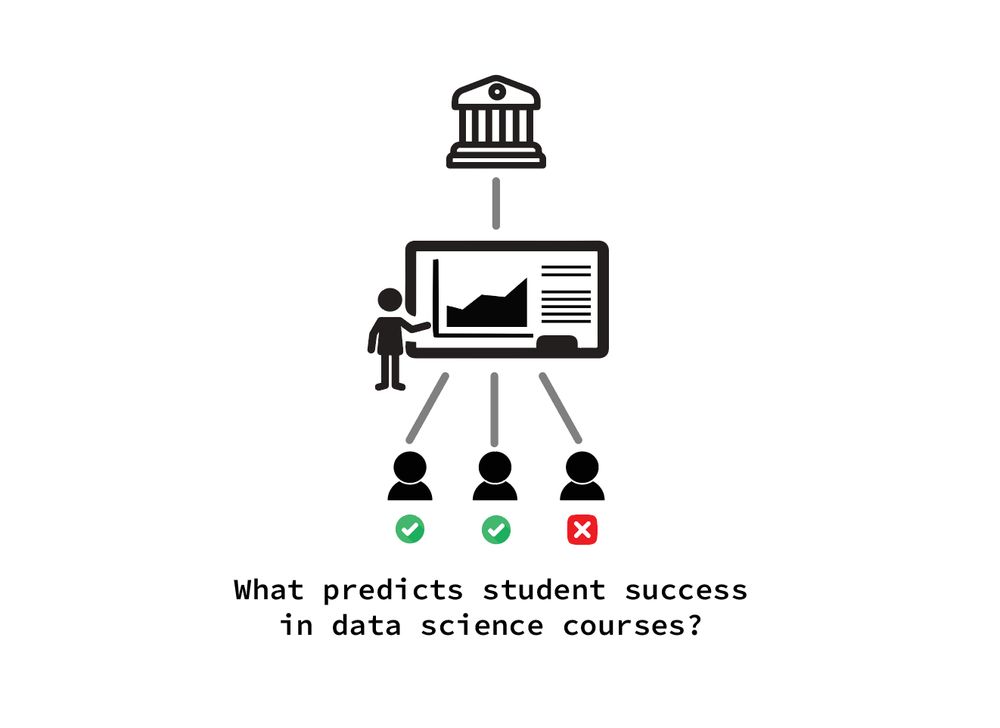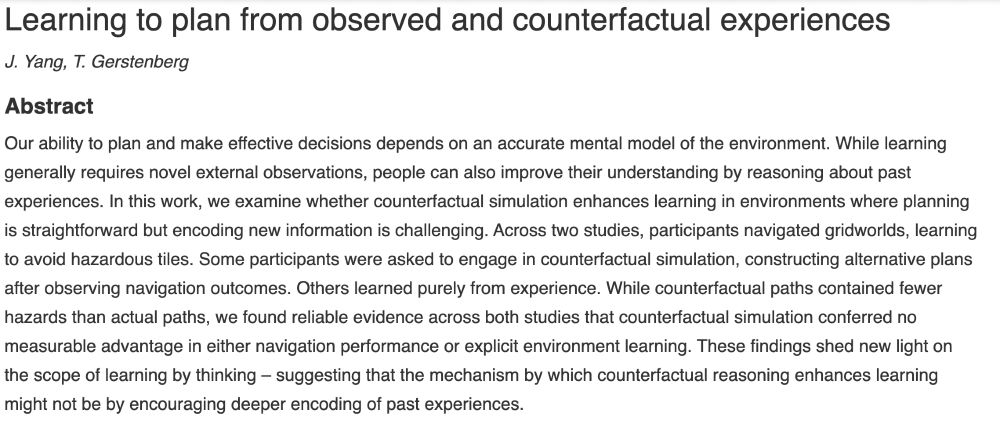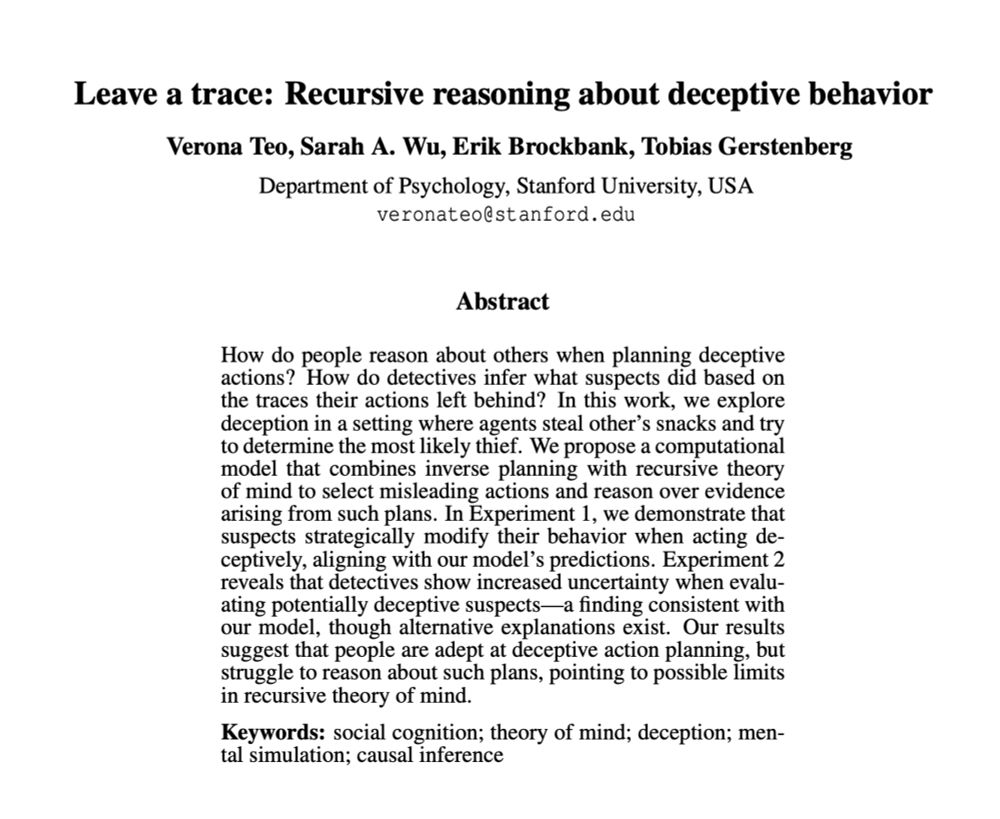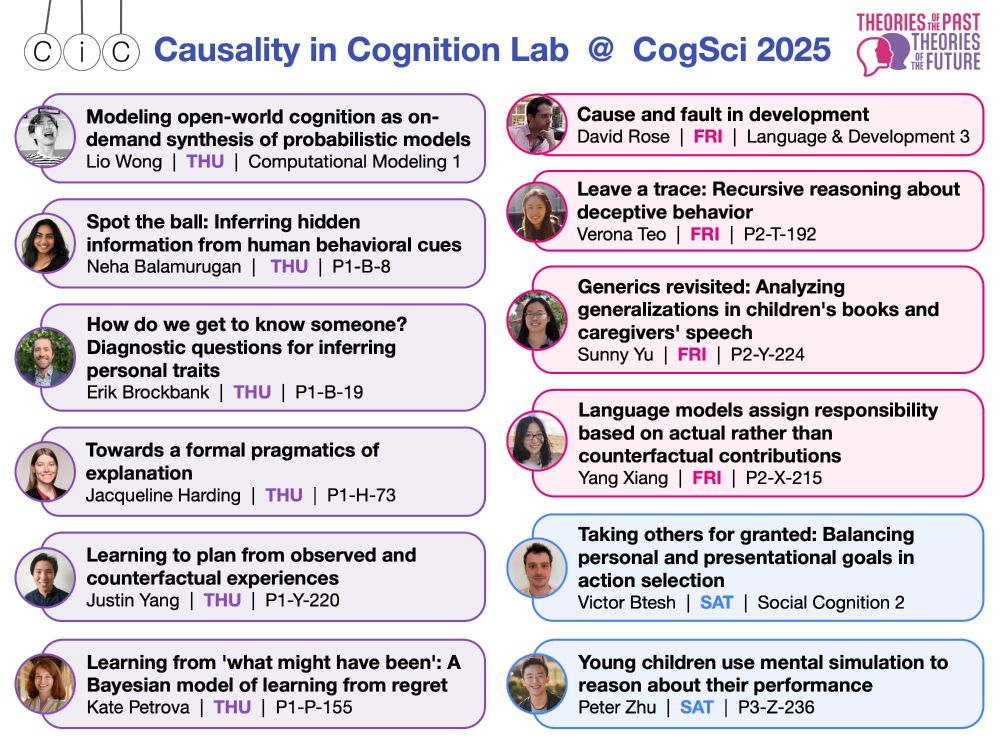
Linking student psychological orientation, engagement & learning in intro college-level data science
New work at @cogscisociety.bsky.social w/ @erikbrockbank.bsky.social @shawnschwartz.bsky.social, C.Bryan, D.Yeager, C.Dweck & @judithfan.bsky.social
poster 8/1 @ 10:30
tinyurl.com/solds-cogsci25
29.07.2025 23:48 — 👍 20 🔁 6 💬 1 📌 1

"36 Questions That Lead To Love" was the most viewed article in NYT Modern Love.
Excited to share new results investigating these and other “deep questions” with @tobigerstenberg.bsky.social @judithfan.bsky.social & @rdhawkins.bsky.social
Preprint: tinyurl.com/bdfx5smk
Code: tinyurl.com/3v6pws4s
29.07.2025 19:49 — 👍 26 🔁 9 💬 1 📌 0

If you’re interested in chatting, come swing by our poster at CogSci (P1-Y-220) on Thursday, July 31 from 1:00PM - 2:15PM!
29.07.2025 23:19 — 👍 3 🔁 0 💬 0 📌 0
Our findings give us a clearer understanding on the relation between counterfactual reasoning and learning. Going forward, @tobigerstenberg.bsky.social and I are excited to explore whether counterfactual simulation may improve people's action policies!
29.07.2025 23:19 — 👍 1 🔁 0 💬 1 📌 0

We found that participants who completed the counterfactual reflections did not avoid more hazardous tiles than those who did not, but improved on the task with more experience. In other words, we did not find reliable evidence that counterfactual simulation yielded a better world model.
3/
29.07.2025 23:19 — 👍 1 🔁 0 💬 1 📌 0

We tested if counterfactual simulation helps people learn a better world model. Participants navigated an environment and learned which locations were unsafe. Some then made counterfactual paths that would've improved on their previous one. Afterwards, they identified unsafe tiles in a test.
2/
29.07.2025 23:19 — 👍 3 🔁 0 💬 1 📌 0

Excited to be sharing my latest work with @tobigerstenberg.bsky.social at #CogSci2025!
Learning usually occurs when we encounter new data. But we also have the capacity to reflect on our past experiences. What can we learn from simulating past experience?
📃 cicl.stanford.edu/papers/yang2...
1/
29.07.2025 23:19 — 👍 26 🔁 9 💬 1 📌 0

Excited to share our new work at #CogSci2025!
We explore how people plan deceptive actions, and how detectives try to see through the ruse and infer what really happened based on the traces left behind. 🕵️♀️
Paper: osf.io/preprints/osf/vqgz5_v1
Code: github.com/cicl-stanford/recursive_deception
1/
28.07.2025 19:11 — 👍 24 🔁 6 💬 1 📌 1

The Causality in Cognition Lab is pumped for #cogsci2025 💪
25.07.2025 15:47 — 👍 57 🔁 8 💬 0 📌 0

Excited to be visiting Boston College today to give a talk on "Counterfactual simulation in causal cognition".
14.04.2025 14:30 — 👍 28 🔁 1 💬 1 📌 1
🤯
07.03.2025 19:28 — 👍 1 🔁 0 💬 0 📌 0
OSF
Hello bluesky world :) excited to share a new paper on data visualization literacy 📈 🧠 w/ @judithfan.bsky.social, @arnavverma.bsky.social, Holly Huey, Hannah Lloyd, @lacepadilla.bsky.social!
📝 preprint: osf.io/preprints/ps...
💻 code: github.com/cogtoolslab/...
07.03.2025 17:05 — 👍 26 🔁 7 💬 4 📌 1
psychology + data science @ stanford
phd student at stanford. developmental cognitive neuroscience. visual perception. infant fmri. she/her.
Computational cognition. Vision. Working memory.
PhD student @ Harvard || computational cognitive science, human decision making and reasoning
Dev Psych PhD Student @stanfordcec.bsky.social
Assistant professor at NYU.
PhD candidate at Stanford Memory Lab. Cog neuro (fMRI/EEG/pupil) of episodic memory and sustained attention lapsing. I also love teaching stats, developing R packages, and building iOS apps. shawnschwartz.com
Assistant professor at NUS. Scaling cooperative intelligence & infrastructure for an increasingly automated future. PhD @ MIT ProbComp / CoCoSci. Pronouns: 祂/伊
Prof at UniMelb. I'm a computational cognitive scientist studying human inference, learning, information systems, culture, and (mis/dis)info. Nerd & opinionated loudmouth in Oz, originally from America, citizen of both. Parent of two. 🏳️⚧️ perfors.net
Assistant Professor of Psychology at the University of Texas at Austin | Studying how people (and AI) reason about the emotions of others
Cognitive scientist and psycholinguist. Currently doing a PhD at Stanford.
Cognitive Scientist. Assistant Professor at UC Berkeley.
🇹🇭 phd candidate w/ @lukejchang.bsky.social in the computational social affective neuroscience lab (cosanlab.com) at @DartmouthPBS.bsky.social
i study social interactions & communication
wasita.space
Cognitive scientist studying play & problem solving
jchu10.github.io
studying social cog dev @ yale
🌲 PhD student at Stanford
🧠 Intersection of developing brain, visual experience, and computational models
🐦 Johns Hopkins alum
imelizabeth.github.io
PhD student @ MIT Brain and Cognitive Sciences
aliciamchen.github.io
PhD @Stanford working w @noahdgoodman and research fellow @GoodfireAI
Studying in-context learning and reasoning in humans and machines
Prev. @UofT CS & Psych









